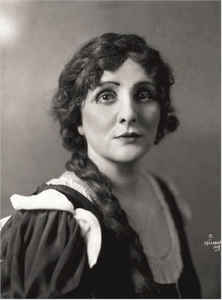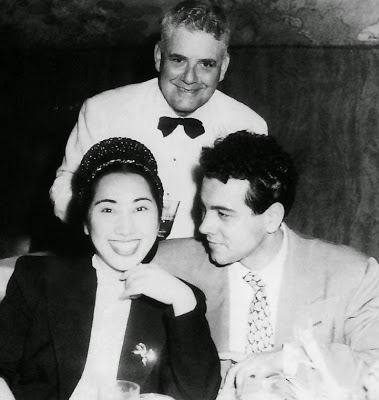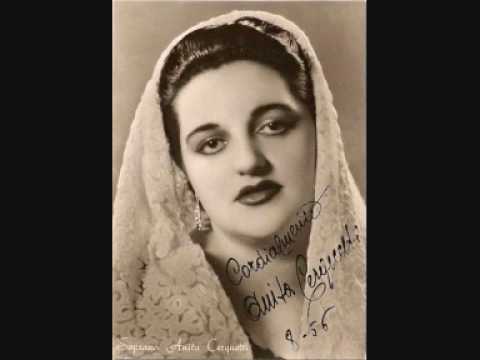|
SATURDEE OPRY LINKS 30:
All-Beauty Edition!
  
Florence Easton
Tomiko Kanazawa with Mario Lanza, conductor Walter Herbert
Anita Cerquetti
Saturdee Opry Links Overture!
Saturdee Opry Links Overture.
"La Traviata," by Verdi.
https://www.youtube.com/watch?v=L0wrWVbi4Jk&fbclid=IwAR1zGp_Fz8GL7yVJ1za8yjJrv8GErm8KKka9Hp8s4sj7EI3MCRMKK8hnMiU
1.
Okay, kids. It's the All Beauty, All the Time edition of Saturdee Opry Links,
beauty being something so badly needed at present. And you know that has to mean
Puccini, Puccini, and also Puccini. I apologize for all humanity that this
astonishing melody has been exploited for car commercials and cat food. Here is
"O Mio Babbino Caro" from the opera, "Gianni Schicchi." And here is the woman
who sang the aria on stage for the first time, ever, Florence Easton, back in
1918, when the opera was brand-new! What father could resist such a plea from a
daughter?
https://www.youtube.com/watch?v=9RyM34Fzp-o
Setting: The bedroom of Buoso Donati, Florence, Italy, 1299
Synopsis: Buoso Donati has died and his relatives have found his will and
discoverd that he has left all his money to the church. Furious, they do not
know what to do. Rinuccio, who is in love with Lauretta but is forbidden to
marry her unless he was left some of the inheritance, sends for Gianni Schicchi
and Lauretta to see if they can help them. When the relatives find this out,
they are furious and argue with Gianni Schicchi. Fed up, he starts to leave, but
Lauretta stops him with this aria, singing that she loves Rinuccio and if
doesn't help them, she will throw herself in the river and die.
Translation:
http://www.aria-database.com/search.php?individualAria=338
About Ms. Easton, the "Nightingale of the South Bank":
https://en.wikipedia.org/wiki/Florence_Easton
2.
I regret there is no footage of Anna Netrebko singing this aria. She is so
expressive, without hamming it up, and her high notes are heroic. This is the
moving, "In Quelle Trine Morbide," from the early Puccini opera, Manon Lescaut.
Notice how it begins piquantly, with a gorgeous, high, floating note.
Setting : Geronte’s house, Paris, France, 18th century
Synopsis : Remembering Des Grieux’s love, Manon is not sure she made the right
decision to live with Geronte. Even with the luxury she has, there is something
that chills her soul.
https://www.youtube.com/watch?v=TLxvl-ljax8
Translation:
http://classicalplus.gmn.com/classical/work.asp?id=2002¬es=true&webcast=true
3.
Puccini's "La Rondine" (The Swallow) is almost an operetta, yet it boasts a
soprano aria that is as beguiling as his greatest. Here is Angela Gheorghiu in a
live rendition at the Met. "Chi il bel sogno di Doretta," or "Doretta's Glorious
Dream." "What does wealth matter compared with blissful happiness?"
https://www.youtube.com/watch?v=P0DIzEP1ACY
Role: Magda, a demimondaine (a woman supported by a wealthy man), Rambaldo's
mistress
Setting: Magda's house in Paris
Synopsis: Magda sings the story of a woman named Doretta and what she dreamed
about.
Translation:
http://www.lieder.net/lieder/get_text.html?TextId=54958
4.
Every time I see or hear "Turandot," I hope it will end differently. I hope that
Calaf runs off with Liu, and Turandot is left alone with her fiendishness. I can
never quite buy her "heart melting" as Turandot discovers love, even though it
is a fairy tale. Here is poor Liu's noble aria, in which she lectures Turandot,
"Tu,Che Di Gel Sei Cinta," before committing suicide. Puccini insisted
on writing the words to
this aria, himself. Sung here by wonderful Leona Mitchell.
https://www.youtube.com/watch?v=o-Gsj70wPrg
Role: Liú, a slave girl
Setting: The gardens before the walls of Peking
Synopsis: After being captured and tortured because she knows Calaf's name, Liú
is asked by Turandot why she resists the torture so well. She replies that her
love for the "Unknown Prince" keeps her from telling his name. She sings that
Turandot's icy heart will one day be melted by Calaf and that Turandot will love
him as Liú does now.
Translation:
https://en.wikipedia.org/wiki/Tu_che_di_gel_sei_cinta
About Leona Mitchell:
https://en.wikipedia.org/wiki/Leona_Mitchell
5.
"Over land and sea there floats a joyous breath of spring," sings Cio-Cio San as
she makes her magical, ethereal entrance in Puccini's "Madama Butterfly." Here is
"Spira sul mare e sulla terra," from the wonderful, heart-rending film version
of the opera, starring soprano Ying Huang.
https://www.youtube.com/watch?v=-Mb4aMPVx5g
Translation: (search for "mare")
http://www.murashev.com/opera/Madama_Butterfly_libretto_English_Italian
Review of the film:
https://www.rogerebert.com/reviews/madame-butterfly-1996
6.
Mario Lanza only sang one opera on stage, tragically succumbing to the lure of
Hollywood instead of a career in opera. That one appearance was "Madama
Butterfly," with the New Orleans Opera (and a Japanese soprano, Tomiko Kanazawa,
in 1948.) The love duet from "Butterfly" was shot for the Lanza movie, "The
Toast of New Orleans," in 1950, with Kathryn Grayson. Grayson's voice was fine
for operetta and musicals, but really not so suitable for this role. Still, this
is the only hint of what Lanza's stage performance was like. David Niven appears
to have been quite moved, as was Mario, who indulged in a little metoo action at
the conclusion.
https://www.youtube.com/watch?v=KAeQkyNgGDk
Translation: (search for "Vogliateme")
http://www.murashev.com/opera/Madama_Butterfly_libretto_English_Italian
About Tomiko Kanazawa:
https://groups.google.com/forum/#!topic/mariolanza/nh_FW5obvnk
Ms. Kanazawa sang “Butterfly” in Lanza’s only performance of a full opera, in
1948. She is in her 90’s today, but no one has tracked her down for an
interview. She seems to have had a very short career.
7.
Unlike "Gianni Schicchi," we do not have a recording of the original soprano
singing "Vissi d'arte" in "Tosca," one Hariclea Darclée, in 1900. Ms. Darclée
was a celebrated Romanian soprano of Greek origin, who enjoyed a three-decade
career. We do, however, have a rather astonishing rendition of "Vissi d'arte,"
from 1956, by one Anita Cerquetti. I mean, my oh my. Cerquetti had a duly
meteoric rise to fame, short-circuited by a fragile personality that led to her
retiring---disappearing abruptly, really---at age 30. Luckily recordings endure.
https://www.youtube.com/watch?v=gIEjoyefMaU
Synopsis: Tosca, having been blackmailed into a promise of sex by Scarpia, in
exchange for Cavaradossi's life, ponders the cruelty of existence.
Translation:
http://www.aria-database.com/search.php?individualAria=302
About Anita Cerquetti:
https://www.nytimes.com/2014/10/17/arts/music/anita-cerquetti-opera-fill-in-who-soared-dies-at-83.html
8.
The great Leontyne Price sings "Se Come Voi Piccina," from Puccini's "Le Villi."
"If I were tiny, like you, pretty flower. . ."
Role: Anna, daughter of Guglielmo, engaged to Roberto
Setting: A town in the Black Forest during spring
Synopsis: Anna puts her bouquet from her engagement celebration in Roberto's
luggage. He is about to leave to go to Mainz where he has been left a fortune.
She hopes that he will think of her when he looks at the flowers.
https://www.youtube.com/watch?v=0niedNvfTP8
Translation:
http://lirybox.com/1022196/translation.pdf
9.
I did say "Puccini, Puccini, and also Puccini," but never trust a Prankster. If
I'd heard this aria and was told it was Puccini, I wouldn't have blinked.
Alfredo Catalani? Who's that? Well, he's the guy who wrote six mostly forgotten
operas, and would have written more had TB not cut him down at age 39. Here is
Anna Netrebko with "Ebben? Ne andro lontana" from "La Wally." "I shall go far
away. . ." (Good idea.) Possibly the most beautiful selection of the day.
https://www.youtube.com/watch?v=9unXavaZwMU
Role: Wally, a young woman, daughter of Stromminger
Setting: The main square of Hochstoff, Switzerland, 19th century
Synopsis: Wally is in love with Hagenbach. However, her father does not like
Hagenbach and wants her to marry his own friend Gellner. He gives her an
ultimatum : marry Gellner or leave the house. When faced with the decision,
Wally decides that she must leave. She despairs that she will never see her
house again but she knows that she must be firm.
Translation:
http://www.aria-database.com/search.php?individualAria=605
FINAL BEAUTEOUS BOW:
One fine day. . .guns will be destroyed. . .One fine day. . .there will be
mandatory national service for young people---to build bridges, care for
forests, tutor the poor, build houses, fix roads, paint murals, etc., to
engender empathy and civility. One fine day. . .corporations will not run and
rape the world. . .And if you believe all that, you are as naive as Cio-Cio San,
who believed that Pinkerton would return and they would live happily ever after.
Here is Ying Huang.
https://www.youtube.com/watch?v=bkUq98oiyRc
Or the great Anna Netrebko, if you prefer:
https://www.youtube.com/watch?v=RIXjFdkA6VU
Setting: Butterfly's house
Synopsis: Three years have passed since Butterfly's American husband left her.
Her servant Suzuki, tries to convince her that he isn't coming back, but
Butterfly is convinced that he will. She sings of the day that he will return.
She dreams of him sailing into the harbor and climbing up the hill to meet her.
Translation:
http://www.aria-database.com/search.php?individualAria=38
Back to Opera Links
Back to Home Page
|



